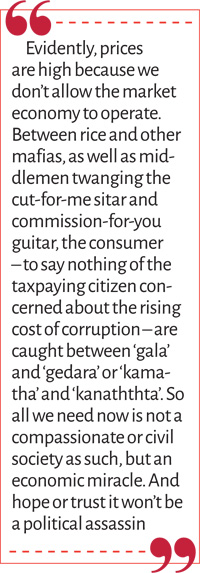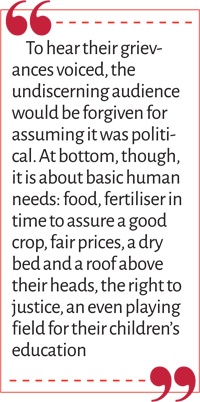Thursday Feb 26, 2026
Thursday Feb 26, 2026
Saturday, 10 July 2021 00:11 - - {{hitsCtrl.values.hits}}

UNHOLY TRINITY – Not what you think! But rather: the triad of farming, fisher and fuel-consuming citizenries. And given the inordinate number of them who comprise our society – it’s time to rethink – Pic by Shehan Gunasekara
 Has civil society lost its spark? In the glory days of yore, it was a many-splendored thing. From politically motivated marches against State terrorism (1992), through standing still and firmly in solidarity by the roadside holding hands in the name of peace (2001), to taking to the streets to decry and try to defeat a pernicious coup (2018)...
Has civil society lost its spark? In the glory days of yore, it was a many-splendored thing. From politically motivated marches against State terrorism (1992), through standing still and firmly in solidarity by the roadside holding hands in the name of peace (2001), to taking to the streets to decry and try to defeat a pernicious coup (2018)...
Today, a glory has passed away from the earth. It is only the salt of the earth – e.g. abject farmers facing a severe fertiliser shortage – who defy prevailing ‘travel restrictions’ to protest haphazard agriculture policy. They’re hardly ‘civil’ at the desperation of their present plight, although they are the backbone (and feeding-hand) of our ‘society’.
If media reports are to be taken seriously – and seeing is believing – discontent with other policies is widespread. To hear their grievances voiced, the undiscerning audience would be forgiven for assuming it was political.
At bottom, though, it is about basic human needs: food, fertiliser in time to assure a good crop, fair prices, a dry bed and a roof above their heads, the right to justice, an even playing field for their children’s education.
It would be a pity if the Government pinned the blame on the pandemic or the health authorities rather than law enforcement for how protestors are often brutally manhandled and their human rights violated by being carted off to quarantine despite courts granting them bail.
One hopes sanity will prevail and media reporting as well as civil society dissent would not be suppressed so that policy-makers and their families can sleep well at night.
While
Social media has become a handy replacement for solid critical engagement, meanwhile, as well as a lazy channel for poorly thought-through responses to the parlous state of the nation.
Long ago, news commentary as much as editorial opinion pieces were written by men and women of letters, and read by everyone. Now, the illiterate rant away on their online soapboxes, and are heard by no one except their fellow-travellers – in echo chambers that are virtual machines for confirming one’s biases.
Of course, this pandemic is the one to blame. Blissfully for poor planners and policy implementers, it has provided a blessed excuse for a litany of sins... both errors in administration and omissions in any societal response. Its name is legion: covering a gamut of late starters and lame ducks, including lacklustre economic growth and lackadaisical public health protocols, as well as lamentable delivery of a plethora of promises made on a long-forgotten election campaign trail. These are duly traduced – or traded as triumphs – in another country: on Facebook or Twitter, for instance.
That is par for the course in polities where excuses for poor performance around the wicket range from lack of political experience to lack of political will... and beyond – into lack of information, and low levels of clear communication. ‘We did it best.’ ‘But I was not given the true picture.’ ‘No one is cooperating properly.’ Thus it’s anybody else’s – in fact, everybody else’s – fault but mine... it’s not cricket, sir.
There may well be legitimate exceptions where the advent of SARS-Cov-2 stymied set targets of certain regimes. For example, the failure of Government to raise much needed tax revenue could be attributed to its ideology backfiring before the engine of growth could start firing properly.
The thinking then was to loosen the reins on one of the traditional pillars of State income – namely, taxes – in the name of stimulating spending by a newly affluent society with putative cash to burn.
But COVID-19 put paid to that stimulus mindset. And the rest is history, as they say. There will no doubt be other interpretations less favourable to the incumbent policy-makers.
 Be that as it may
Be that as it may
Sundry mainstays of Government revenue – grants, export earnings, FDIs – remain cramped, crippled or compromised by not entirely compassionate geopolitical agendas.
On top of the global milieu, the picture at home is still pretty rosy for local corporates; with leading banks among other top players publishing profits after tax in double-digit billions of rupees.
In this context, it is incumbent on the State to rethink its tax policy at the very least. At best, it must start taxing the rich... again – that’s where the revenue stream can be ramped up.
So where is civil society: to check, challenge and compel its elected representatives to change course on continuing to give corporate Sri Lanka an unjustifiably large blank cheque by dint of lowered tax thresholds?
Well, some of the choleric ones are at his majesty’s leisure, while craven examples of brown-nosing of blood-letting are enlarged. Other more melancholic souls have had their style cramped by sterling amendments to the Constitution that empower the Executive at the expense of free speech and other undesirable elements of a militarised society.
The only types sanguine enough to stay the course have been threatened – with no Government denials to date, in which event it will become official – with closure, or worse? so behave, or else! A few phlegmatic individuals still pray to the effete deities of law, order, virtue, justice, discipline, et al.
By the way
In the real world, any analytical framework of administrative policy must be driven by planning, as well as analysis and recalibration of project or programme implementation based on results.
And in any civilised society – especially one that has recently shied away from a neoliberal model as Sri Lanka has ostensibly done – there could be a better-advised and strategic attempt to tax the rich while exempting the poor. Or put in place the safety nets that are characteristic of a truly compassionate society – for the lower socio-economic brackets, who tend to bear the brunt of State taxation.
Taxing the rich is not as politically unpopular as policy-makers hesitant to make the first incision may assume. In fact, the more conscientious citizens amongst the upper echelons of society may even welcome it – as evinced by one private sector mandarin and fiscal analyst on a talk show recently.
Another non-negotiable is the proper taxing and pricing of power and energy. It is vital to properly tax fuel, for instance. The price at the pump must have – despite the ramifications to the poor – a stiff tax on top of the international price of diesel and petrol (plus distribution and storage costs), as there are negative externalities such as pollution and road accidents associated with its consumption.
This is not as bad as it may seem, as the world prices of oil plummeted (by around 50% last year, in fact) in the wake of COVID-19.
The bigger picture for Sri Lanka at present is pertinent. We import about $ 20 billion worth of goods. Fuel imports are at about four billion dollars (when the price of crude oil is at $ 60-70 per barrel). We export about 500 million dollars worth of refined products including bunkering oil and aviation fuel.
Our nett spend on fuel totals $ 3.5 billion – by far the single largest component of our import bill. So it is vital that we price this scarce resource judiciously to ensure efficient utilisation. In the absence of an automatic pricing formula (except shortly in 2002-4 and briefly resurrected during the 2015-19 period), the recent hikes came as a shock although the increases were long overdue.
The irony is that these hikes – especially diesel by Rs. 7, Rs. 111 at the pump – may not be enough. It is still being sold at a loss. Sri Lanka consumes some 2.5 billion litres of diesel and only 1.8 million litres of petrol. Given that petrol at Rs. 157 will make a profit for the State of between Rs. 4–4.50 per litre, but will lose Rs. 12 for diesel, there is no possibility of cross-subsidisation – given the low ratio of petrol to diesel volumes.
 Power to the people
Power to the people
A solution could or should have been incremental increases according to an automatic fuel pricing formula – an aspect of a possibly impending IMF bailout’s restructuring criteria, which helps one understand why a 17th tranche for Sri Lanka may be unwelcome at present. But watch this space? The recent price shock, though dire, will not necessarily fuel inflation, unless booster shots at pricing give people multiple jabs!
Diesel, meanwhile, is zero-taxed (the total taxation on diesel is Rs. 12.50 per litre – Rs. 7.50 PAL, Rs. 6.50 excise duty...) – so selling it at a Rs. 12.50 loss means literally ‘zero tax’ on diesel.
Interestingly, and related to this, a 2016 World Bank study on household incomes indicated that the top 30% of households in Sri Lanka get the benefit of this ‘subsidy’ (as they consume more). The bottom 10% of households are the hardest hit: as they consume less, directly, as well as indirectly, through goods and services.
A possible solution, according to Advocata Institute Chairman Murtaza Jafferjee, is to recalibrate the Samurdhi programme’s Rs. 52 billion disbursement a year for 1.7 million people, which he sees as ‘excessive’ – since it’s wider than the actual poverty net. Instead, he proposes a cash transfer to those under the real poverty net, in lieu of high market prices, with the upper echelon households having to pay the full unsubsidised price at the pump.
“Why are we playing politics with fuel?” he asks, bemused; adding that Bangladesh, Nepal and India don’t: their prices at the pump are Rs. 204, 205, 250 ... our per capita income (post depreciation) is over $ 3,500 while theirs are all under 2,200 – so they’re much poorer. “Whose benefit are we seeking?” questions the analyst.
In fact, it is the rich who also benefit from cheaper kerosene prices. According to reportage, it was no less an eminence than former Treasury Secretary Dr. P. B. Jayasundara who pointed out that the highest consumption of kerosene is in the Gampaha District – by virtue of the high number of garment factories there.
Evidently, prices are high because we don’t allow the market economy to operate. Between rice and other mafias, as well as middlemen twanging the cut-for-me sitar and commission-for-you guitar, the consumer – to say nothing of the taxpaying citizen concerned about the rising cost of corruption – are caught between ‘gala’ and ‘gedara’ or ‘kamatha’ and ‘kanaththta’. So all we need now is not a compassionate or civil society as such, but an economic miracle. And hope or trust it won’t be a political assassin.
In other – unrelated – news this week, we have a new Finance Minister. We (I use the editorial or royal plural, although this is neither) have been awaiting a sort of Man from UNCLE – a tough-minded, thoroughly trained, total genius at ‘economic development’, haven’t we? And I know at least one person who will be a monkey’s uncle if prices at the pump don’t start to plummet, farmers behave better even sans fertiliser and fishermen put out to sea again with their customary panache at the advent of this ‘one head fits better than all others put together’ panacea.
(Journalist | Editor-at-Large of LMD | Writer WFH)